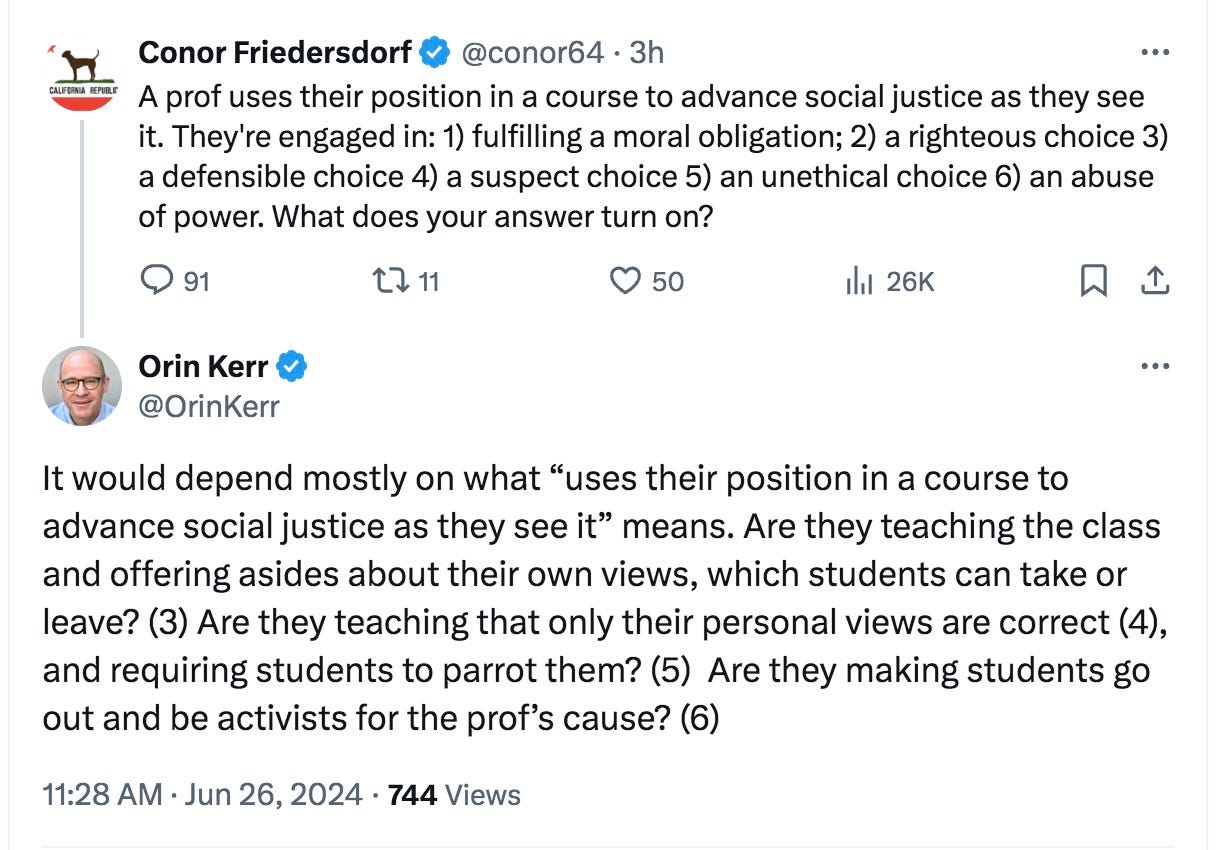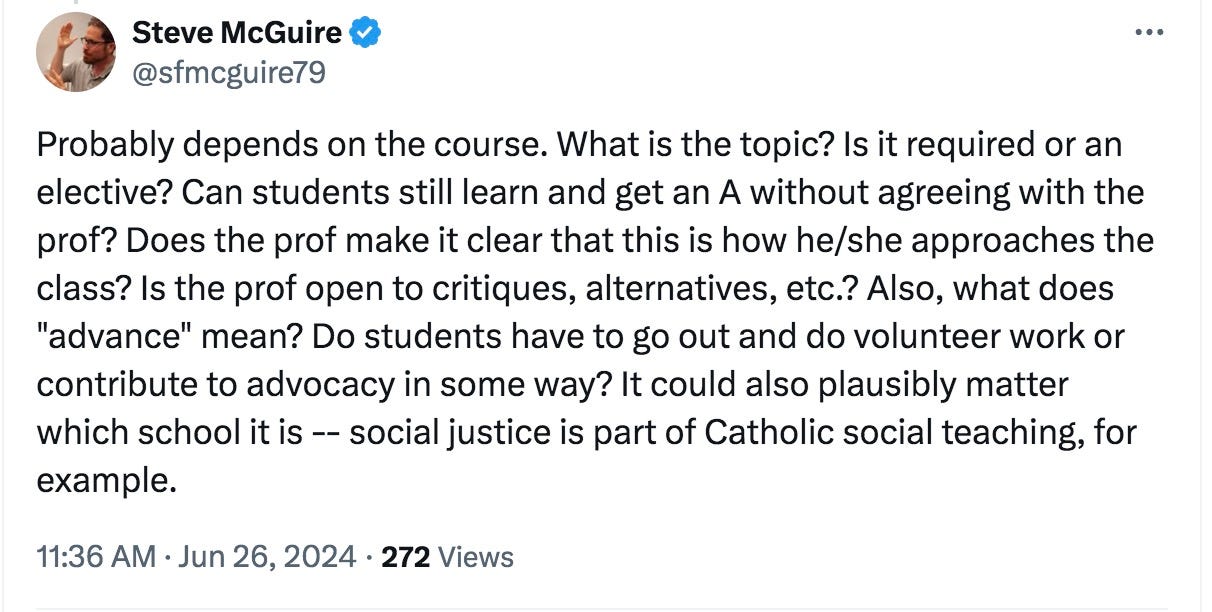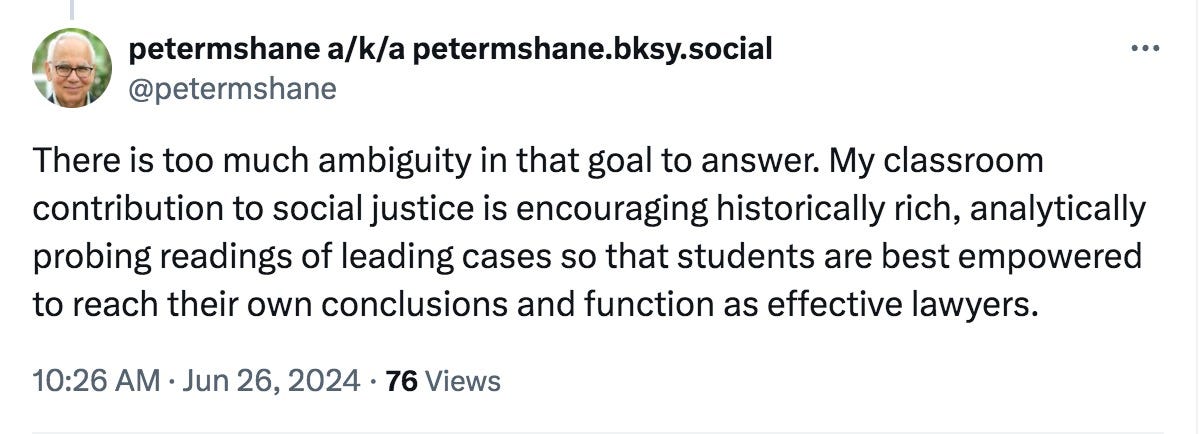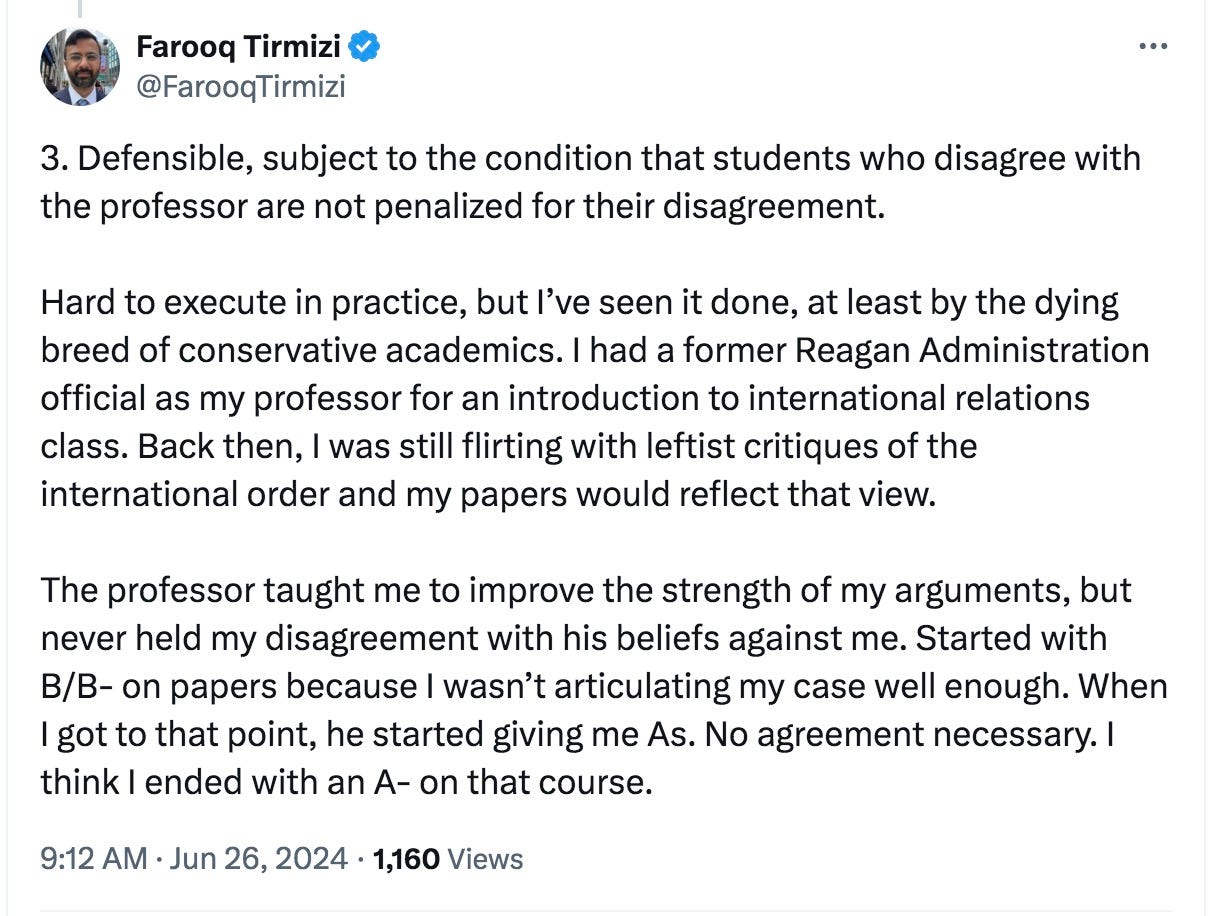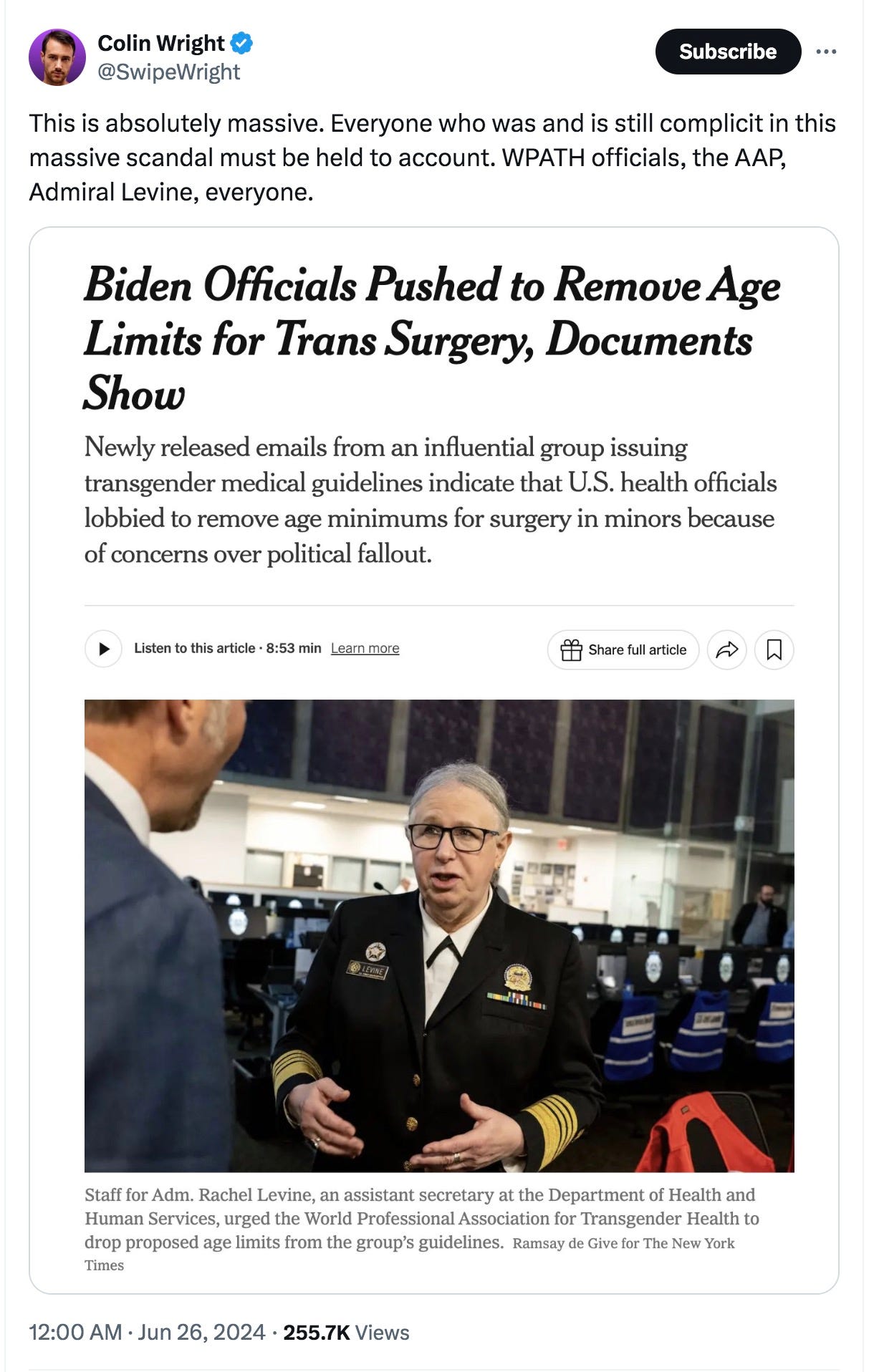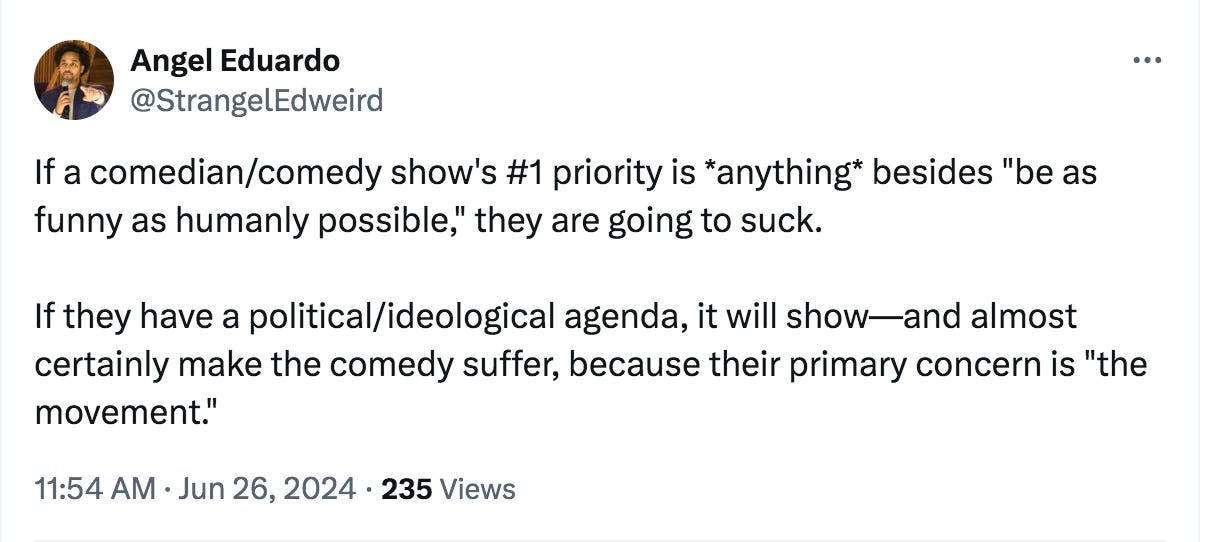E-Pluribus | June 26, 2024
Learning from 'losers'; cheap fakes and red herrings; and well-intentioned misinformation is still misinformation, no matter the source.
A round-up of the latest and best musings on the rise of illiberalism in the public discourse:
Alan Elrod: The Virtue of the Losers’ Table
"Winning isn't everything, it's the only thing," UCLA football coach Henry Russell is credited with saying. The sentiment is a popular one in the political arena as well. Writing at Arc Digital, Alan Elrod says we should not be so quick to dismiss those out of power. After all, E pluribus unum.
In some parts of America, single-party dominance has often been the norm. Today, single-party control of state government is a reality in more states than ever, and in many red states that control features the same anti-democratic and illiberal impulses that have overtaken the national Republican Party.
It’s incumbent on state and local governments, even in places with strong partisan leans, not to run roughshod over dissent or abrogate the right of groups with whom they disagree to free and full participation in civic life.
But these abuses are possible in part because Americans across the political spectrum have internalized the idea that living amongst your political opponents is only acceptable when you can dominate them. Under this mindset, living in the minority is to be avoided whenever possible. There’s a partisan asymmetry here—no prominent Democrat denigrates rural areas like various Republicans denigrate cities—but many liberals seem to have accepted the principle that some places are for them and some are for those other Americans.
Consider the implications of Jason Aldean’s viral pop-country polemic “Try That In a Small Town.” Strip away the lib-owning bravado and racially charged subtext and you get to the core of the message: these places are not for you. You being everyone from carjackers to progressive activists—equally criminal in Aldean’s eyes.
Concerningly, a lot of left-of-center folks seem to agree with Aldean that they want no part of small-town America.
Democratic-oriented and progressive-minded voters have been steadily moving to places like Colorado’s booming urban areas for decades. Even within the state, people are shopping for that ideal political plot of land, with partisanship affecting house hunting habits. Last year, Bret Weinstein, the owner of a Denver realty company, told the AP’s Nicholas Riccardi that politics often gets “brought up in our initial conversations.” Conservatives are acting similarly, with one Idaho resident telling Riccardi, “If state-level government has that much power, you'd better be sure it reflects your values, and not someone else's values that are forced on you.”
These are wretched sentiments because they reveal the instinct that democracy is about dominating or being dominated. But liberal, pluralistic democracy must by necessity run deeper than mere power politics.
[. . .]
Many Americans do not have quite as much choice about where they live in the first place. Financial, professional, and familial commitments making moving an impossibility for many—realities that make the deterioration of democratic and civic life where they live all the more tragic.
Many are also almost certain to be some sort of minority wherever they are—either ethnically, religiously, or culturally. And I certainly won’t say that, for example, young pro-choice women should move to states with highly restrictive reproductive rights. But in general, it would be nationally and locally beneficial to find ways to engage with public and civic spaces where we are not in the majority, whether or not moving is an option.
Read it all.
Kenin M. Spivak: Attacks on ‘Cheap Fakes’ Extend Biden Administration’s War on Free Speech
“Fake news!” Donald Trump tends to shout whenever he gets bad press, whether or not what’s being reported is true. At Real Clear Policy, Kenin Spivak accuses the current White House of a similar tactic, with “cheap fakes” substituted for “fake news.”
There were two astonishing developments this week in the Biden administration’s continuing attack on free speech. First, just days ahead of the Supreme Court’s decision on whether to uphold the Fifth Circuit’s injunction against the administration’s extensive censorship enterprise, a second White House press secretary strongly encouraged the media to chill political debate. Second, Karine Jean-Pierre was masterful in her delivery of the new Biden attack line on “cheap fakes.”
[. . .]
Attacking a new category of “cheap fake” videos, KJP blasted the media for publishing unaltered video of the president’s frailties. Her objection appears to be that by presenting information about the president out of the context preferred by the administration, this video is, in effect, fake…
[. . .]
KJP claimed these videos are “misleading,” “manipulated” and “deep fakes.” A deep fake is false. But, what KJP really means is to falsely allege that the videos are out of context. As such, her attack has all the earmarks of the administration’s censorship campaign against “malinformation.” The administration defines three categories of speech it asserts should be censored, misinformation and disinformation, which include falsehoods, and “malinformation,” which is used out of context, specifically, truthful information that does not have a progressive spin.
Aside from the misinformation in KJP’s attack – the videos presented by mainstream media and respected conservative online publications are revealing, unedited windows into a physically and cognitively impaired president; they are neither out of a context necessary to understand what we are seeing, nor manipulated. Regardless, the White House press secretary (as contrasted to a campaign spokesperson), has no business demanding censorship of videos that paint the president in a bad light.
[. . .]
Labeling speech as “misinformation” does not strip it of protection.
[. . .]
Speaking directly to KJP’s demands, Justice Kennedy added: “The mere potential for the exercise of that [censorship] power casts… a chill the First Amendment cannot permit if free speech, thought, and discourse are to remain a foundation of our freedom….The response to the unreasoned is the rational; to the uninformed, the enlightened; to the straight-out lie, the simple truth…Society has the right and civic duty to engage in open, dynamic, rational discourse. These ends are not well served when the government seeks to orchestrate public discussion through content-based mandates.”
Read the whole thing.
Matt Yglesias: Elite misinformation is an underrated problem
And speaking of misinformation, you can put all the lipstick you want on the misinformation pig but it’s still misinformation, writes Matt Yglesias (though not in so many words.) In his latest at Slow Boring, Yglesias takes on the respectable misinformation promulgated by mainstream institutions.
[E]rroneous ideas that are perpetrated by mainstream institutions — what I’m going to call “elite misinformation” — are a really big deal in an underrated way.
I don’t want to rehash this in detail, because it’s been well covered recently, but a good example of this sort of misinformation is the narrative about a huge rise in maternal mortality in the United States. Because as a growing chorus of critics has been pointing out, this increase was largely the mechanical result of a change in counting methods, not in the public health situation. That’s bad, but what’s really shocking, as I learned from Jerusalem Demsas, is that key actors are totally unapologetic about sowing confusion:
Christopher M. Zahn, the interim CEO of the American College of Obstetricians and Gynecologists, wrote a lengthy statement in response, arguing that “reducing the U.S. maternal mortality crisis to ‘overestimation’” is “irresponsible and minimizes the many lives lost and the families that have been deeply affected.” Why? Because it “would be an unfortunate setback to see all the hard work of health care professionals, policy makers, patient advocates, and other stakeholders be undermined.” Rather than pointing out any major methodological flaw in the paper, Zahn’s statement expresses the concern that it could undermine the laudable goal of improving maternal health.
This strikes me as a shortsighted and pernicious way to think about the purpose of communicating with the public. And yet, people are out here saying it in public!
Years ago, when I didn’t cover climate and energy topics at all, I floated the idea of a piece making the point that not only were carbon tax proposals politically toxic, but all these various schemes to subsidize clean energy seemed like a relatively inefficient way to reduce fossil fuel use. Wouldn’t it be better to just get global governments to cut their massive subsidies for fossil fuel use first?
[T]hese scandalously high subsidies were widely covered in the mainstream press, nobody really seemed to follow the basic logic of them. If fossil fuels are receiving massive subsidies, then by far the best and most growth-friendly way to decarbonize is to cut the subsidies. On the one hand, yes, this information made me feel more strongly than ever that the world should act decisively on climate change. At the same time, though, it made the actual policies being pushed by mainstream environmental groups seem kind of weird. Why not tackle the subsidies?
Well, it turns out that these stories about subsidies, though widespread, are incredibly misleading.
They’re based on an annual report put out by the International Monetary Fund, whose most recent edition is headlined “Fossil Fuel Subsidies Surged to Record $7 Trillion.” That’s a lot! But check out the fine print on the chart.
The vast majority of the “subsidies” are “implicit subsidies,” which include “undercharging for environmental costs.” In other words, they are characterizing governments’ failure to impose a carbon tax as a “subsidy” for fossil fuel use.
[. . .]
[I]nstead of explaining itself clearly, the IMF is putting out misleading headlines, which are then picked up and bounced around by mainstream media outlets.
In the context of misinformation studies, it probably wouldn’t count as misinformation if someone believed, because they read a New York Times write-up of an IMF report, that “Around the world, taxpayers are helping to support fossil fuels through subsidies when their money could be funding green energy transitions instead.” And, in fact, to the credit of the New York Times article in question, the ninth paragraph of the story does explain what’s going on. But the whole beginning of the article makes it seem like we’re talking about direct subsidies. And because there are nonzero direct subsidies, the rest of the article discusses why those are politically difficult to scrap in the countries that have them. Similarly, the IMF explains what they mean right there in the fine print of the chart. They’re not lying, exactly. But it’s hard to understand why the IMF would do this, unless they thought it was a good idea to trick people.
Read it all here.
Around Twitter (X)
A hypothetical from Conor Friedersdorf and a sampling of replies:
Via Colin Wright. The New York Times reports that the Biden administration allowed political considerations (!) to influence national health policy:
And finally, Angel Eduardo has the audacity to believe that the primary mission of comedians should be… being funny. No joke.







